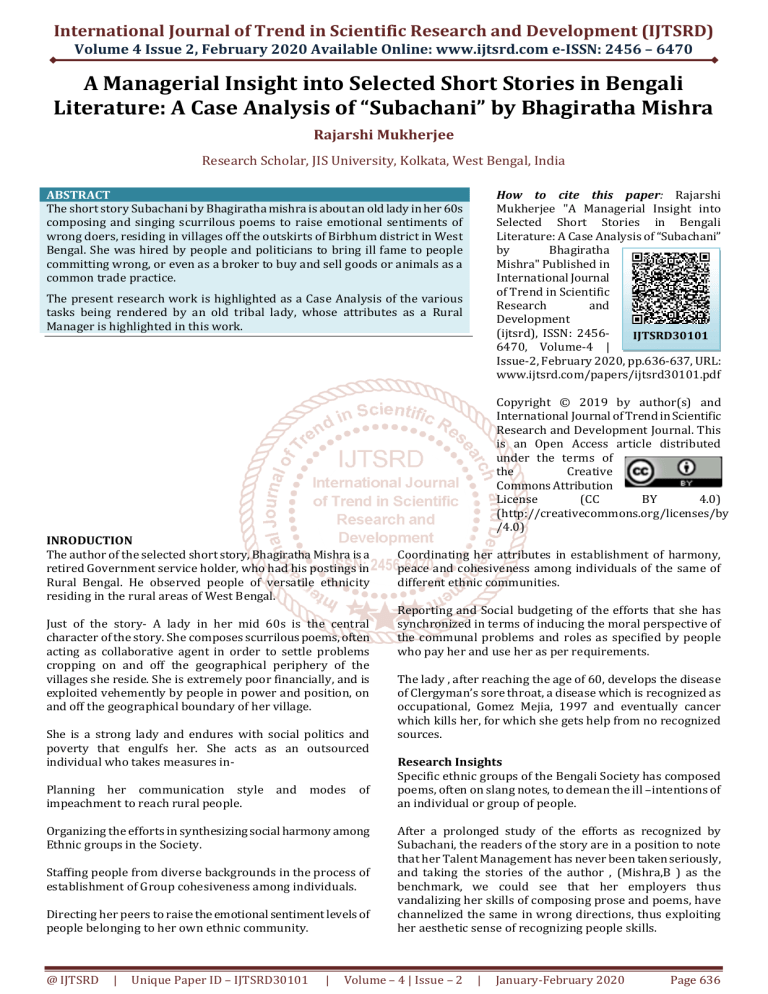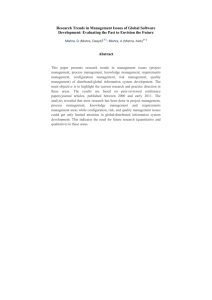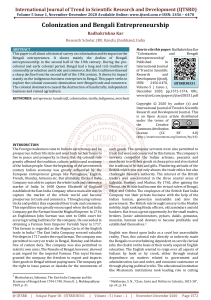
International Journal of Trend in Scientific Research and Development (IJTSRD)
Volume 4 Issue 2, February 2020 Available Online: www.ijtsrd.com e-ISSN: 2456 – 6470
A Managerial Insight into Selected Short Stories in Bengali
Literature: A Case Analysis of “Subachani” by Bhagiratha Mishra
Rajarshi Mukherjee
Research Scholar, JIS University, Kolkata, West Bengal, India
ABSTRACT
The short story Subachani by Bhagiratha mishra is about an old lady in her 60s
composing and singing scurrilous poems to raise emotional sentiments of
wrong doers, residing in villages off the outskirts of Birbhum district in West
Bengal. She was hired by people and politicians to bring ill fame to people
committing wrong, or even as a broker to buy and sell goods or animals as a
common trade practice.
How to cite this paper: Rajarshi
Mukherjee "A Managerial Insight into
Selected Short Stories in Bengali
Literature: A Case Analysis of “Subachani”
by
Bhagiratha
Mishra" Published in
International Journal
of Trend in Scientific
Research
and
Development
(ijtsrd), ISSN: 2456IJTSRD30101
6470, Volume-4 |
Issue-2, February 2020, pp.636-637, URL:
www.ijtsrd.com/papers/ijtsrd30101.pdf
The present research work is highlighted as a Case Analysis of the various
tasks being rendered by an old tribal lady, whose attributes as a Rural
Manager is highlighted in this work.
Copyright © 2019 by author(s) and
International Journal of Trend in Scientific
Research and Development Journal. This
is an Open Access article distributed
under the terms of
the
Creative
Commons Attribution
License
(CC
BY
4.0)
(http://creativecommons.org/licenses/by
/4.0)
INRODUCTION
The author of the selected short story, Bhagiratha Mishra is a
retired Government service holder, who had his postings in
Rural Bengal. He observed people of versatile ethnicity
residing in the rural areas of West Bengal.
Just of the story- A lady in her mid 60s is the central
character of the story. She composes scurrilous poems, often
acting as collaborative agent in order to settle problems
cropping on and off the geographical periphery of the
villages she reside. She is extremely poor financially, and is
exploited vehemently by people in power and position, on
and off the geographical boundary of her village.
She is a strong lady and endures with social politics and
poverty that engulfs her. She acts as an outsourced
individual who takes measures inPlanning her communication style and modes
impeachment to reach rural people.
of
Organizing the efforts in synthesizing social harmony among
Ethnic groups in the Society.
Staffing people from diverse backgrounds in the process of
establishment of Group cohesiveness among individuals.
Directing her peers to raise the emotional sentiment levels of
people belonging to her own ethnic community.
@ IJTSRD
|
Unique Paper ID – IJTSRD30101
|
Coordinating her attributes in establishment of harmony,
peace and cohesiveness among individuals of the same of
different ethnic communities.
Reporting and Social budgeting of the efforts that she has
synchronized in terms of inducing the moral perspective of
the communal problems and roles as specified by people
who pay her and use her as per requirements.
The lady , after reaching the age of 60, develops the disease
of Clergyman’s sore throat, a disease which is recognized as
occupational, Gomez Mejia, 1997 and eventually cancer
which kills her, for which she gets help from no recognized
sources.
Research Insights
Specific ethnic groups of the Bengali Society has composed
poems, often on slang notes, to demean the ill –intentions of
an individual or group of people.
After a prolonged study of the efforts as recognized by
Subachani, the readers of the story are in a position to note
that her Talent Management has never been taken seriously,
and taking the stories of the author , (Mishra,B ) as the
benchmark, we could see that her employers thus
vandalizing her skills of composing prose and poems, have
channelized the same in wrong directions, thus exploiting
her aesthetic sense of recognizing people skills.
Volume – 4 | Issue – 2
|
January-February 2020
Page 636
International Journal of Trend in Scientific Research and Development (IJTSRD) @ www.ijtsrd.com eISSN: 2456-6470
As per the theory of Human Capital, (Schultz, T.A. 2002)
Subachani suffers a huge setback and her efforts in
recognizing her own creative Endeavour goes wasted.
Subachani as an employee is always sincere to her own
efforts and performance in perspective of composition of
songs, though scurrilous, and an agent in finalizing
important deals.
The bauri ethnic tribal group has always composed prose
and poems, the community to which Subachani belongs. This
is an important insight towards loss of Human Capital
(Schultz and others, 2007).
The language as spoken by Subachani is a colloquial Bengali,
and extensive literature comprising of the same have been
done by Dr. Kumar Rana , with the supportive aspects
rendered by the Pratichi Educational Trust in Birbhum, a
@ IJTSRD
|
Unique Paper ID – IJTSRD30101
|
body funded by Amartya Sen, et.al, the famous Nobel
laureate in their works.
The cultural development of this kind has been mentioned
by Jean Derez and Sen Amartya, in their paper entitled
“Development as Freedom” (Derez J and Sen, A, 2000). Such
languages and their regular enrichment has been
encouraged by the team of experts from the Indian Institute
of Rural Management, Anand, Gujarat.
The Ethnic tribal groups highlighted in the research inducing
story, and their magnitude of poverty has been set as the
backdrop image in the story. After utilizing and subsequently
exploiting their services, the people like Subachani are
thwarted towards the avenues of life with but little financial
awards and gains. They are induced to beggary, and are fed
with stale and rancid food, capitalizing upon the ill-sayings,
as a societal bouncer, the role which Subachani plays in
terms of the scanty pay that she receives.
Volume – 4 | Issue – 2
|
January-February 2020
Page 637




